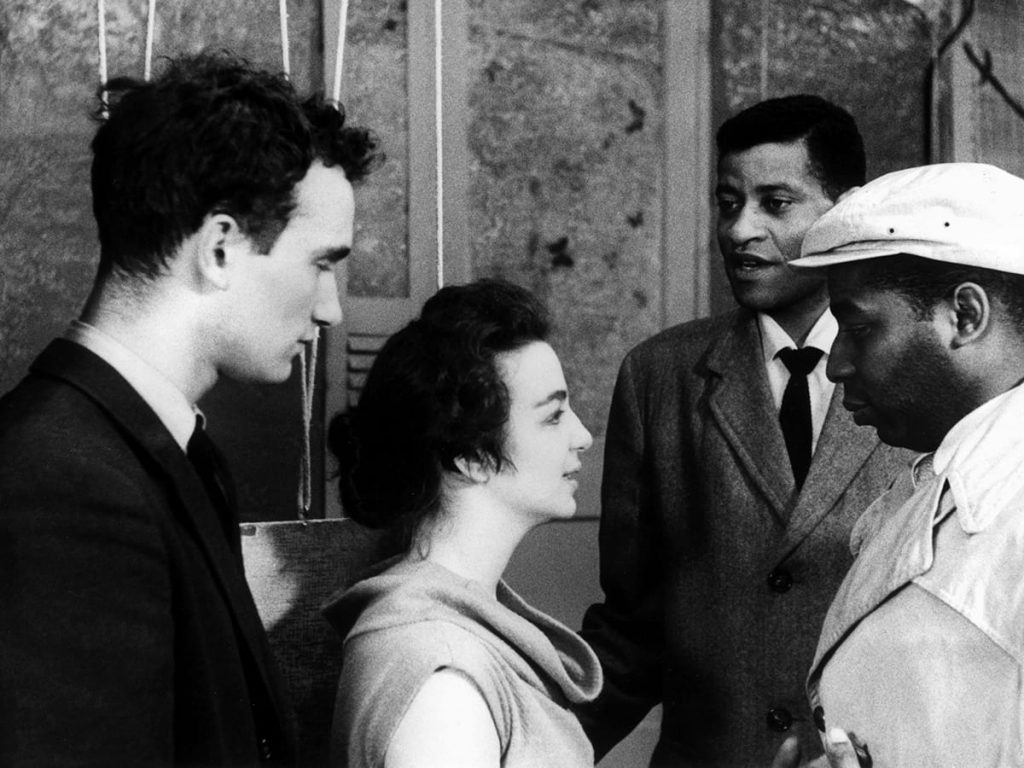Film Review: Shadows (1959)


At a glance, John Cassavetes’ debut directorial feature, Shadows (1959), might seem like a bit of a mess. I would understand and acknowledge this conclusion with one breath, but with the next, I would ask you to look deeper. Yes, the plot is sparse, the editing choppy, the sound poorly synced, and the acting questionable at times, but with just a little bit of effort, it’s not hard to find the intangible power that’s happening within Shadows. The raw energy and abandon with which the film was made is both inspirational and nearly impossible to recreate (even though Cassavetes essentially shot the film twice, once in 1957 and again in 1958). I found myself realizing that what I was witnessing was true freedom from restraint and truly independent filmmaking. There was no fear among the troupe, and it shows.
Cassavetes is considered by many to be the father of American independent cinema, with Shadows being the first in a long line of films by him and others. Considered the forerunner to the “New Hollywood,” or “American New Wave” movements, Shadows was fully funded by Cassavetes and shot guerrilla-style on the streets of New York City. The film is often described as improvised, which is a bit misleading. The rough story grew out of an improvisational exercise that Cassavetes oversaw at his acting workshop, and the original shooting was heavily guided by the director and largely unscripted, but far from fully improvised. After receiving a bad reception in its original, very limited theatrical run in 1958, Cassavetes decided to reshoot much of the film, this time with a fully realized script. The result of these two different shoots is a jazz-like, free-flowing film that, even with its technical flaws, cuts through the B.S. and gets right at the heart of its subject matter.

And that subject matter was pretty biting and unapologetic for 1959. The loose plot centers around three African American siblings living in New York. The oldest brother, Hugh (Hugh Lard), is dark-skinned, while Lelia (Lelia Goldoni) and Ben (Ben Carruthers) are light-skinned, both often passing for white. Hugh, a down on his luck musician, spends his days and nights looking for paying gigs with his manager Rupert (Rupert Crosse), while Ben occupies his time with his friends, picking up girls and getting into fights. Lelia seems content playing the socialite and artist at fancy “literary” parties, flirting her nights away. Trouble arises when Tony (Anthony Ray), a white hipster type, takes an interest in Lelia thinking that she is also white. When he finds out otherwise, trouble brews.

Interestingly, this heavy-sounding plot doesn’t actually take up much screen time. We spend most of the film getting to know our three main characters and how they interact with each other and those around them. That’s not to say that the racial nature of the main narrative isn’t important. It certainly is important, and it’s what gave audiences such a shock back in 1959, but it’s treated so “every day” that, at times, it’s nearly forgotten. It’s a strange sensation to be so lost in what you’re witnessing that you forget the main plot element, but these characters go about their lives in such a free-form fashion, we have no choice but to gladly join them on their ride.

I would personally have liked to have seen the hypocritical nature of white 1950s intellectual liberal hipsterdom explored and exposed further. But, I suppose cultural appropriation probably wasn’t a defined phenomenon in the late 50s. After all, where would all of these beatniks have been without jazz music, rock ‘n’ roll, and the many other cultural elements ripped off from the black community? The film is about race, but it’s not consumed by race, which is fine, but I feel there was room for a little more gravity to be placed on the subject. That’s really my only gripe with the film. Of course, the subject has been broached many times in film since, and with varying amounts of success, but I can’t help wonder what Cassavetes would have to say about it all now—the just under the surface racism and cultural appropriation of his hipsters and artists of the 50s and 60s—in the racial and political climate we live in today. We can never know, of course (Cassavetes died in 1989), but I certainly am curious.

All told, the film is no technical achievement. But, it more than makes up for its formal shortcomings with heart, guts, and drive. It is unafraid to be what it is, and it’s obvious that everyone involved knew they were creating something special. Did they know they were helping to start a film movement? Who knows, but I beg you, don’t get bogged down in the clunkiness of Shadows. Instead, just let go, let it happen, and let it take you on a ride.
United States • 1959 • 82 minutes • Black & White • 1.33:1 • English • Spine #251
Criterion Special Features Include
- New, high-definition digital restoration, with uncompressed monaural soundtrack on the Blu-ray edition
- A Constant Forge: The Life and Art of John Cassavetes (2000), a 200-minute documentary by Charles Kiselyak (Blu-ray)
- New interviews with actress Lelia Goldoni and associate producer Seymour Cassel
- Silent footage from the Cassavetes-Lane Drama Workshop, from which Shadows emerged
- Restoration demonstration
- Stills and poster galleries
- Trailer
- English subtitles for the deaf and hard of hearing
- PLUS: A booklet featuring an essay by critic Gary Giddins and a 1961 article by Cassavetes (DVD release)
